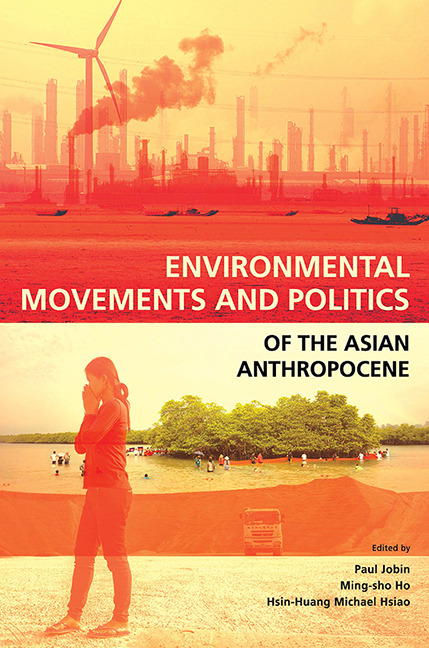Book contents
- Frontmatter
- Contents
- List of Tables, Maps and Figures
- Acknowledgements
- About the Contributors
- 1 Environmental Movements and Politics of the Asian Anthropocene: An Introduction
- 2 Environmental Movements in Taiwan’s Anthropocene: A Civic Eco-Nationalism
- 3 Environmental Movements in Post-handover Hong Kong: Between Managerialism and Radicalism
- 4 The Post-politics of Environmental Engagement in Singapore
- 5 Environmental Movements in the Philippines: Contestation for Justice in the Anthropocene
- 6 Environmental NGOs in “Post-New Order” Indonesia: Saving the Forests Through Democracy
- 7 Environmental Activism in Malaysia: Struggling for Justice from Indigenous Lands to Parliamentary Seats
- 8 State, NGOs, and Villagers: How the Thai Environmental Movement Fell Silent
- 9 Environmental Movements in Vietnam under One-Party Rule
- 10 The Cambodian Neopatrimonial State, Chinese Investments, and Anti-dam Movements
- 11 Conclusion: Environmental Movements and Political Regimes, or Why Democracy Still Matters in the Anthropocene
- Index
7 - Environmental Activism in Malaysia: Struggling for Justice from Indigenous Lands to Parliamentary Seats
Published online by Cambridge University Press: 08 October 2021
- Frontmatter
- Contents
- List of Tables, Maps and Figures
- Acknowledgements
- About the Contributors
- 1 Environmental Movements and Politics of the Asian Anthropocene: An Introduction
- 2 Environmental Movements in Taiwan’s Anthropocene: A Civic Eco-Nationalism
- 3 Environmental Movements in Post-handover Hong Kong: Between Managerialism and Radicalism
- 4 The Post-politics of Environmental Engagement in Singapore
- 5 Environmental Movements in the Philippines: Contestation for Justice in the Anthropocene
- 6 Environmental NGOs in “Post-New Order” Indonesia: Saving the Forests Through Democracy
- 7 Environmental Activism in Malaysia: Struggling for Justice from Indigenous Lands to Parliamentary Seats
- 8 State, NGOs, and Villagers: How the Thai Environmental Movement Fell Silent
- 9 Environmental Movements in Vietnam under One-Party Rule
- 10 The Cambodian Neopatrimonial State, Chinese Investments, and Anti-dam Movements
- 11 Conclusion: Environmental Movements and Political Regimes, or Why Democracy Still Matters in the Anthropocene
- Index
Summary
Environmentalism can be seen as resulting from differences in material conditions and perspectives on how to live and develop sustainably. This chapter describes these differences and set them in the context of Malaysia's recent history. Following on from Guha and Martinez Alier (1997) and Martinez Alier (2002), we depart from the view that environmentalism is a luxury that emerges only when basic needs are fulfilled.1 We rather consider that the positioning of environmental problems depends on the space available for doing so in the public sphere (Justus et al. 2009). Borrowing from the environmental justice approach, this chapter considers how environmental issues have become entangled with problems of land rights of Indigenous Peoples, particularly in East Malaysia.
Environmental justice is critical of the selective or complete exclusion of local communities for the sake of logging or mining interests, as well as deforestation for vast cash crops like rubber or palm oil (Sicotte and Brulle 2018). In early industrialized countries like the United States, environmental justice mobilizations started with conflicts over the unequal distribution of ecological burdens like waste disposal and air pollution. Although these sorts of conflicts have spread to developing countries, in the latter, social conflicts are still generally provoked by unfair access to natural resources or their destruction by mining, unsustainable logging, and the like (Aiken and Leigh 2015; Majid Cooke et al. 2018; Martinez Alier 2018). By extension, environmental justice is also critical of the cult of wilderness that, in the past, has equated conservation with preservation, for example, through the formation of national parks or the preservation of commons (Schlosberg 2013). Environmental justice has broadened conservation to consider landscapes and biospheres as places where people live, not museums to be preserved.
The discourse of “authentic native identity” aims at regaining the access of Indigenous Peoples to their customary lands. This narrative has won some support through the judicial system. The Orang Asli groups of West Malaysia and the myriad groups officially categorized as “natives” of East Malaysia (Sabah and Sarawak) have won a number of court cases through conservation claims as their livelihoods depend on the ecosystem of these places (Aiken and Leigh 2011). Although this strategy for recovering customary land rights has met with some success, in cases of conflicts over natural resources, the rhetoric of “authentic native identity” might exclude other “native” claims from individuals with equal rights (Murray Li 2001).
- Type
- Chapter
- Information
- Environmental Movements and Politics of the Asian Anthropocene , pp. 203 - 232Publisher: ISEAS–Yusof Ishak InstitutePrint publication year: 2021

